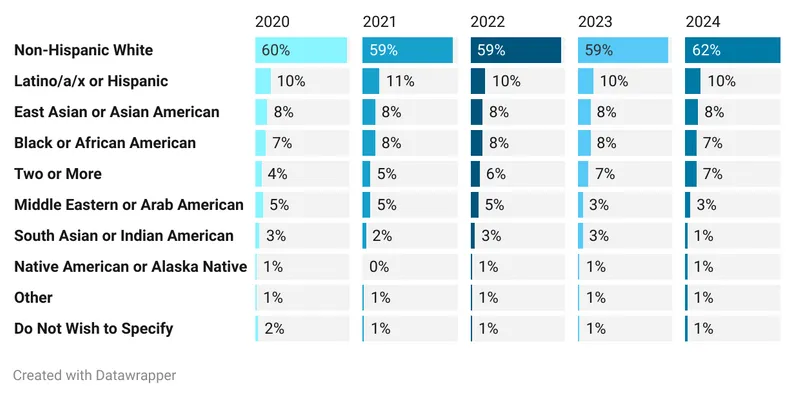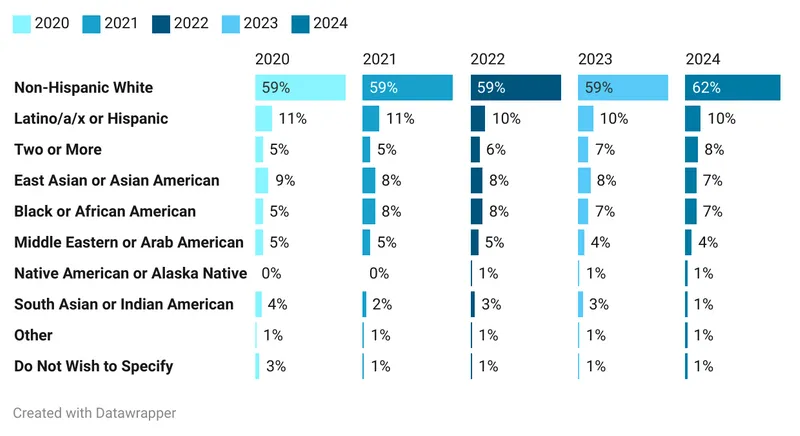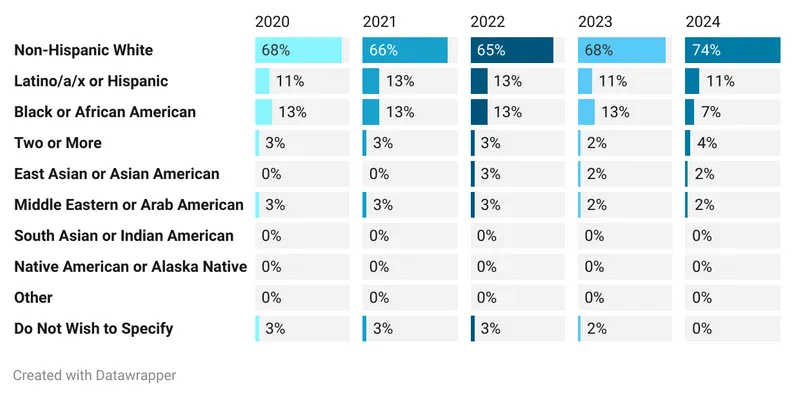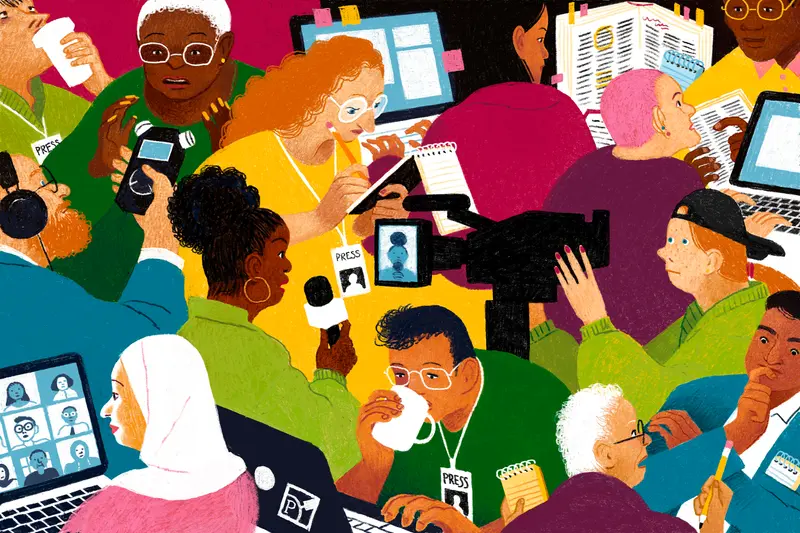ProPublica is committed to increasing the diversity of our workplace as well as the journalism community more broadly, and each year we publish a report on those efforts. This is the report for 2024; here are all our past reports.
Our Commitment
We believe that it is imperative to staff our newsroom and business operations with people from a broad range of backgrounds, ages and perspectives. We are committed to recruiting and retaining people from communities that have long been underrepresented, in journalism broadly and in investigative journalism especially. That includes African Americans, Latinos, other people of color, women, LGBTQ people and people with disabilities.
ProPublica has continued to expand, growing from 172 full-time employees at the start of 2023 to 186 in 2024, due in part to the creation of our Northwest team and additions to our development, audience and visual teams.
Our diversity efforts last year were wide-ranging, with the launch of an investigative editor training program that is open to journalists across the U.S., a large presence at journalism affinity conferences and a webinar for former conference stipend recipients and other early career journalists who have participated in previous ProPublica programs.
We also continued to formalize some of our formerly staff-run, volunteer diversity efforts, built partnerships with outside journalism organizations and looked for ways to improve the internal culture and processes for all ProPublicans.
Our Diversity Committee comprises more than 50 ProPublicans who volunteer their time to work on initiatives that are pitched and run by the staff. The current co-chairs are Vianna Davila, Melissa Sanchez and Liz Sharp.
Breakdown of Our Staff
As with last year, we tracked candidates through the application and interview process. Out of 21 positions filled in 2023, 50% of the candidates we interviewed identified as women and 36% identified as being part of a racial/ethnic group other than solely non-Hispanic white. About 67% of the people we hired identified as women.
However, 29% of those people we hired in 2023 identified as being part of a racial/ethnic group other than solely non-Hispanic white — a lower percentage than ProPublica had hired in previous years.
“Recruiting and retaining a diverse staff is one of ProPublica’s core principles,” said ProPublica editor-in-chief Stephen Engelberg, responding to the hiring numbers. “We are proud of the progress we’ve made, but we agree that there’s more to be done.”
This year, Engelberg said, ProPublica added a full-time talent acquisition manager “to make sure our job searches reach the broadest possible group of applicants."
At the start of 2024, the percentage of all ProPublica staff members who identified as solely non-Hispanic white was 62% — slightly higher than in previous years. This percentage was the same for editorial positions.
For the sixth year in a row, more women than men work at ProPublica. About 2% of our staff identify as nonbinary or transgender. In editorial positions, women represented 51% of the staff.
Since 2022, we have collected demographic information about our board of directors. Half of the 14 people on the board identified as women, the same as last year. About 64% of the directors identified as non-Hispanic white, compared to 71% last year.
As we’ve said since 2015, part of our commitment to diversity means being transparent about our own numbers. Here’s how our staff breaks down.
(Please note that the data is based on employees’ self-reported information. Recognizing that some people may identify as more than one race but not identify as a person of color, in 2022 we began stating numbers in terms of people who “solely identify as non-Hispanic white.” We hope this will provide more specificity and accuracy. The employee information is as of Jan. 1 of each year. Managers are defined as staff members who supervise other people, and that group does not include all editors. Percentages may not add up to 100 because of rounding. Fellows, time-limited employees and part-time employees are not included in this analysis.)
Race and Ethnicity: All of ProPublica

Race and Ethnicity: Editorial

Race and Ethnicity: Managers

Gender: All of ProPublica

Gender: Editorial

Gender: Managers

New Initiatives
Investigative editor training: ProPublica started an Investigative Editor Training Program in 2023 for journalists who want to learn how to manage, edit and elevate investigative projects that expose harm and create impact. The curriculum for the yearlong program was designed by ProPublica chief of correspondents Ginger Thompson and deputy managing editor Alexandra Zayas to increase diversity in the next generation of investigative editors. We did a test-run for the program for nine ProPublica staffers. Then we refined the training and invited journalists from other organizations to apply. More than 150 reporters and editors from news organizations across the country applied. We selected 11 people to attend a weeklong training at our New York office, where they heard from ProPublica editors on different aspects of the craft, from story selection and memos to managing the reporting and digging into the first draft. After that, participants were paired with ProPublica senior staff as mentors and received additional virtual training for the remainder of the year. We are offering this training again this year for external participants.
Alumni virtual meetup: After a hiatus in 2022, ProPublica staff hosted a career-building webinar for “alumni” of our various external programs, including Emerging Reporters, the Data Institute and our conference stipends. Irena Hwang, Maya Miller and Ellis Simani volunteered their time to organize this event and surveyed alumni about what kinds of skills they wanted to build. The virtual event, held in September, included a panel on “building your investigative career” featuring Ginger Thompson, Zahira Torres, Lulu Ramadan and Kavitha Surana. That was followed by breakout rooms on workshopping a pitch, managing up, specialty reporting and becoming an editor. More than 50 early-to-mid-career journalists attended the event, and more than a half-dozen ProPublicans lent their expertise as breakout-room moderators. Our goal is to continue to build on the success of this program in 2024 and provide another opportunity for community members to come together.
Our Ongoing Efforts
ProPublica thinks about its efforts in the following ways: building the pipeline (for us and for all of investigative journalism); recruiting talent and improving our hiring process; and inclusion and retention.
Building the Pipeline
Conference stipends: ProPublica previously offered stipends to help student journalists attend conferences. Last year we changed this program to instead partner with Investigative Reporters & Editors (IRE) and sponsor five journalists to attend the annual IRE convention. IRE’s diversity scholarship supports journalists, students and educators from diverse backgrounds, including people of color, those who identify as part of the LGBTQ+ community and/or people with disabilities. We also sponsored a Journalists of Color mixer at the conference, which was attended by more than 50 people.
Emerging Reporters Program: The program provides financial assistance and mentorship to five students for whom investigative journalism might otherwise be inaccessible so they can pursue early career opportunities in the field. The program includes a $9,000 stipend, virtual programming and an all-expenses paid trip to an IRE conference on computer assisted reporting. This is the program’s ninth year, and it is coordinated by Talia Buford. Check out our most recent class and find out more about the program.
Data Institute: In 2016, ProPublica journalists founded The Data Institute, a workshop for journalists on how to use data, design and code. ProPublica eventually started working with Open News, which coordinates student and instructor participation and provides support for project management and event planning. The Ida B. Wells Society for Investigative Reporting and the Center for Journalism & Democracy now organize this in-person event. Last year a half-dozen current and former ProPublicans served as trainers at the institute, which is focused on empowering people with data skills they can bring back to their own newsrooms. ProPublica staffers will continue to serve as trainers at the institute this year.
Recruiting and Hiring
Affinity conferences: Last summer, ProPublica newsroom staff and senior leadership partnered with The Marshall Project and The Trace at the country’s three largest affinity journalism conferences. At the Asian American Journalists Association conference, the three organizations hosted a panel about paths into nonprofit news that also included participation from a staffer at the Center for Public Integrity. The panel was followed by a beverage lounge, where anyone could drop by for refreshments. The organizations hosted a reception at the National Association of Black Journalists conference, put on through the convention’s Investigative Task Force, that included journalists from The Texas Tribune and The Intercept. ProPublica staff also participated in three conference sessions focused on investigative reporting. At the National Association of Hispanic Journalists conference, the three journalism organizations hosted a booth along with The Texas Tribune, The Intercept and CPI. This work was led by ProPublica staffers Maya Miller, Irena Hwang and Ellis Simani. Going forward, ProPublica’s talent department will assume responsibility for this work.
Salary equity and transparency: ProPublica management regularly analyzes salaries in job categories where there are at least four employees and, when necessary, adjusts those salaries to ensure equity by race and gender in each job and location group, while taking into account years of experience. This analysis started in 2021. We do this because we want to try to eliminate the effects of any unconscious bias in setting salaries. In addition, since the fall of 2022, ProPublica has published salary ranges for all posted job openings, regardless of geography.
Rooney Rule: We require that hiring managers interview at least one person who does not self-identify as solely non-Hispanic white. In addition, every application must be read by at least two people.
Freelancer guide: In 2022, ProPublica published a guide for freelancers interested in pitching an investigation to ProPublica. We designed the guide to formalize the pitch process and level the playing field for how freelance projects are presented and considered. Submissions will be reviewed by editors on a rotating basis. ProPublica will respond to anyone who completes the form, even if their proposal is not accepted.
LRN candidate outreach: Editors with ProPublica’s Local Reporting Network continued to do personalized recruiting and offered office hours so local journalists could discuss their accountability work with a member of the team. LRN editors were also present at affinity journalism conferences, where they met with interested applicants in an effort to help them with the project-development and application process.
Inclusion and Retention
Welcoming new hires and focusing on internal culture: Our inclusion subcommittee includes about 30 ProPublicans who meet monthly to consider ways to make the newsroom more inclusive and equitable. Duaa Eldeib chairs this subcommittee. Some of the issues the group has been tackling include ways to improve ProPublica’s fact-checking process and build community, particularly for employees who work remotely. The subcommittee launched an internal story club that meets regularly to discuss particularly enjoyable stories, podcasts or books.
Sensitivity subcommittee: Led by Colleen Barry and Andrea Wise, this group serves as a resource for editors and reporters to tap the collective brain trust of our newsroom when working on particularly sensitive stories about suicide, sexual abuse, child abuse, racial trauma and more. The committee maintains a Slack channel where anyone can share resources and where editors and reporters can solicit feedback on drafts or ask questions on how best to report on sensitive subjects. When a “sensitivity read” or the discussions during the editing and production of a story are particularly instructive, the subcommittee has shared those experiences at diversity committee meetings so any lessons can be more broadly applied.
ProPublica Peer Partnership Program: This is an internal program organized by Jodi Cohen and Lisa Song that matches ProPublicans with a mentor or peer partner to meet each other, develop new skills and have someone to turn to for help navigating workplace or career questions. Last year more than 50 ProPublicans participated in this program, which was started in 2018.
Unconscious bias training: Since 2021, ProPublica has contracted with Paradigm Reach to provide ongoing diversity, equity and inclusion training for staff. The training is required of all new managers.
Diversity Committee office hours: We have continued to offer a casual virtual hangout twice a month where ProPublicans can chat with the Diversity Committee co-chairs to brainstorm about diversity, equity and inclusion initiatives, ask questions about ProPublica’s ongoing DEI programs or chat about diversity-related concerns in a more intimate setting outside of the monthly committee meetings.
Interested in Working Here?
Here is our jobs page, where we post new positions, including fellowships, full-time and temporary roles.





